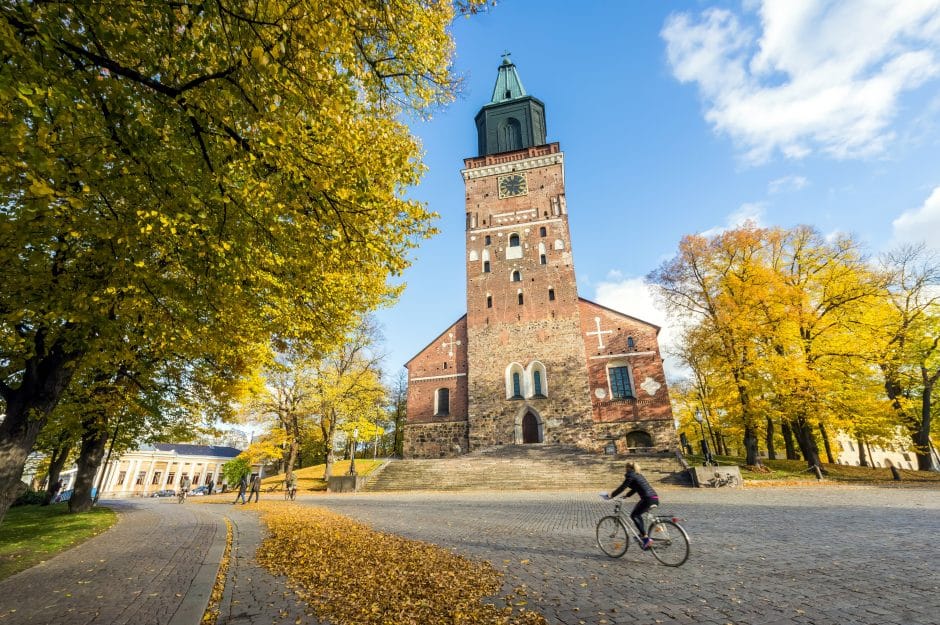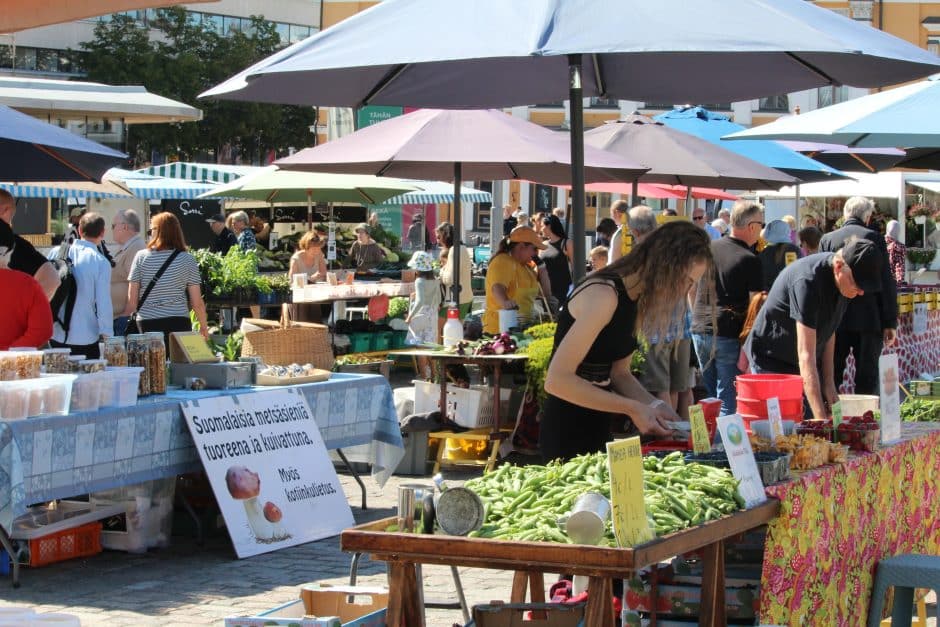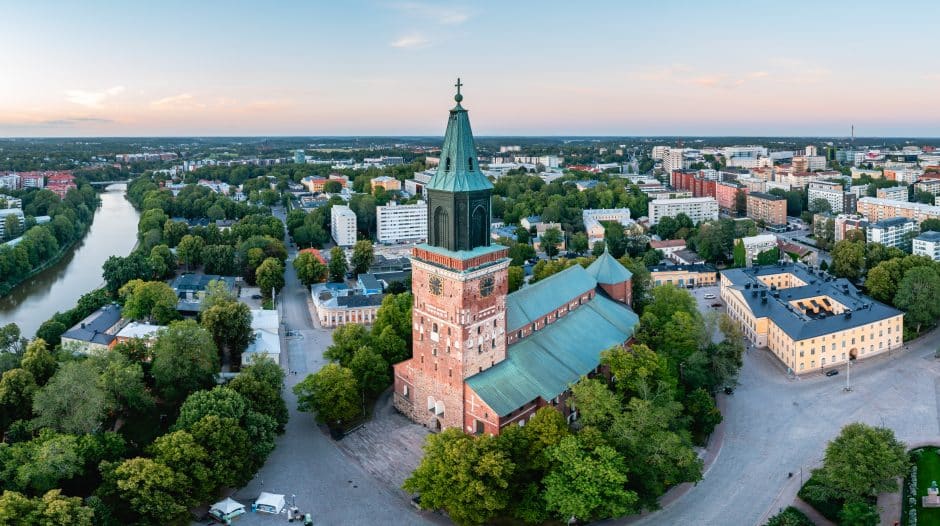Turku is changing mindsets for a climate-positive city

There aren’t many cities that can confidently claim they’ll reach climate neutrality by 2029. On the southwest coast of Finland, the city of Turku can, and is on track to do so, reaching net-zero on the year marking the city’s 800th birthday. Turku’s most ambitious climate endeavours go beyond technological solutions and policy changes. The city is embarking on a transformative journey to reshape the mindsets of its citizens, businesses, and the city administration. Through the innovative ‘1.5-Degree City’ project, Turku is weaving climate action into the fabric of daily life, from how people move around the city, to how they engage with hobbies, demonstrating the potential of small, collective changes that ripple through the community.
Reaching its target by 2029 will put Turku one year ahead of Europe’s most ambitious cities – which, alongside Turku, are part of the EU Mission to deliver 100 climate-neutral and smart cities by 2030 – and 21 years ahead of the EU and UN targets of climate-neutrality by 2050. Climate KIC leads the NetZeroCities Pilot Cities Programme, supporting the city in developing the capabilities and learning mindset needed to reach its ambitious goals.
Turku is the oldest city in Finland, dating back to 1229. It has occasionally enjoyed administrative supremacy, having also been the country’s first capital. Its ambitious climate plan is often held up as exemplary. Between 1990 and 2023, the city already reduced its carbon emissions by 63%.
“Sometimes in Turku we say that we are more famous internationally for our climate work than locally. The 1.5-Degree City project aims to communicate our emission reduction actions and goals widely to Turku citizens,” points out Heli Huuskonen, Project Manager of the 1.5-Degree City Project in Turku.
Among the city’s climate-related successes are a climate-neutral district heating system, resulting from years of investment in clean energy, a range of sustainable energy solutions that meaningfully reduced the use of fossil fuels (in 2022, 78% of the district heating system came from renewable sources), and a focus on the circular economy. Staying on track for the 2029 target in the future will require further decarbonisation of the city’s energy sources, as well as even more efficient measures in transport, industry and construction.
Changing mindsets for climate-neutrality by 2029
Turku’s envious track record has brought benefits to companies, citizens, and the entire city according to Huuskonen – but there is still a considerable effort required to meet their targets.
Like many European counterparts, consumer-related emissions from mobility and transportation, and waste and water usage remain a major roadblock to achieving climate neutrality. The city has no direct control over these as they are mostly dictated by consumer habits and behaviour.
“We are not as far in our journey as we’d like to be with transportation, mobility and consumer-related emissions, these are the sectors that are the most challenging for us. We have a history of fossil fuels, and we have made huge improvements, but if we want to reach climate neutrality, we need to change more than energy and mobility systems, we need to change our entire mentality. This is true for Turku, for Europe, and the whole world,” says Huuskonen. “We need to change the mentality here in the city administration, but also our citizens’ and companies’.”
In this context, the city identified the Pilot Cities Programme as an opportunity to scale up its efforts in this domain, taking their city to the next level as an experimentation and learning hub to explore how to orchestrate the changes required for a successful transition. Turku has come to the programme with its pilot, the ‘1.5-Degree City’, indicative of the lifestyle it is aiming to foster.
“In the end, this change of mentality is very important, but also challenging,” says Huuskonen. “Our Pilot City project is a tiny piece of the puzzle that will help us understand what the opportunities are for behaviour change in making climate-neutral Turku possible.”
According to Huuskonen, the city has experience in engaging citizens, but not as much in the climate domain. Learning how to do this not only holds potential for decreases in emissions, but is also essential in targeting domains for which the city has no control over, such as citizen consumer behaviour.
A 1.5-Degree City
To succeed in their ambitious climate goals, the city is banking on increased involvement from all local actors, targeting a whole-of-society shift in mindset.
The ‘1.5-Degree City’ Pilot places the city as the facilitator of cooperation, communication, business empowerment, and citizen engagement. Through three thematic pillars, the project has been designed to foster cross-sector collaboration in climate work, bringing the city, companies and citizens in as partners with the common goal of a climate-neutral city. With this, they’ll increase their ability to deliver a robust policy framework, accompanied by strong technological, financial and business models.
“We can’t work successfully on our own – we need to collaborate with companies, with our citizens, universities, other cities in Finland and beyond. That’s why we joined the EU Mission and the Pilot Cities Programme, to network and learn from each other,” says Huuskonen.
Access to useful information and strong communication is key: the first component of the pilot, the Climate Situation Room, on the one hand centralises information for different target groups such as citizens, companies, local decision makers and stakeholders, and provides useful information on climate work from different sectors. On the other hand, it functions as a strong tool for communication, building awareness and providing businesses and citizens access to important information.
Its second axis focuses on business empowerment, building on a network of companies that dates back to 2018, and already comprises 120 companies and 110 climate actions. The pilot will extend this network, bringing more actors into the mix, and strengthening their community for increased cooperation and sharing of good practices.
Citizen-centred action is delivered by a third pillar, which has been designed in close collaboration with the University of Turku, who provides necessary expertise around behaviour change and ‘climate nudging’.
Stemming from this research, the city is now testing how to promote sustainable mobility options during people’s free time, for instance, after work while they go to run errands or engage in a hobby. In general, the city of Turku is ensuring that public transport is an easy and attractive option, through good infrastructure and affordable ticket fares. The city will test ways to change people’s attitudes to public transport, hoping to instil this as a more favourable option in their minds and make it more likely that they will opt for this.
According to various surveys, about 90% of all Finnish people – and 96% of those under ten years old – say they have a hobby. This offers valuable opportunities for mainstreaming climate-neutral and healthy lifestyles with other activities.
“We want to involve these associations and through them we want to engage the citizens because, as in many cities, we also find it challenging to have direct contact with our citizens,” says Huuskonen.
The results of this Pilot could give fascinating insights into how cities can limit carbon emissions by impacting people’s behaviour through strategic partnerships that facilitate communication with citizens, and which factors citizens are more likely to respond to. The work of these associations will be strengthened by Climate Ambassadors: individuals or organisations with an existing audience and community ties, and who can tangibly demonstrate what a 1.5-degree lifestyle is like, with an emphasis on small changes everyone can make.
Huuskonen firmly believes that “living a sustainable lifestyle is not miserable, and doesn’t imply giving up something important. It has the power to increase the well-being, health, and quality of life for individuals but also of everyone around them.”
In time, the hope is that similar initiatives could be designed for increasingly diverse target groups, which could lead to sizeable impacts on carbon emissions from food, mobility, leisure, consumer goods and services simultaneously.
Through this and other climate initiatives, Turku has positioned itself as a facilitator of change towards climate neutrality, playing a central role in understanding their citizens and designing ways to co-create with them and other urban actors.
The next frontier?
In 2029, Turku will turn 800, and hopefully become of the first cities to reach climate neutrality. At that point, the sum of its emissions will be net zero, or below. The next frontier is becoming climate positive, meaning the sum of local emissions is increasingly negative, creating an environmental benefit by removing additional carbon dioxide from the atmosphere.
The transformation required for a climate-neutral – never mind a climate-positive – city cannot be achieved without the involvement, willingness and buy-in from citizens. Fostering curiosity, interest, and pride in their ability to embrace a sustainable lifestyle is beyond the remit of only the city. The hope is that with the right partners and approach, it can increasingly become reality. Cultivating an understanding of who to work with and how to bring people onboard is an essential step in creating longer-term sustainable engagement, in which people feel ownership over the impact they can make and agency in their daily decisions.
This article is part of Climate KIC’s #LiveableCities Campaign, where we explore the pathways to a climate neutral, just, and more beautiful future. By 2030, our goal is to help transform over 400 cities into thriving, climate-resilient communities. This campaign captures the stories and lessons of ambitious cities in Europe and around the world. We want to show a vision of what’s possible when cities and stakeholders come together to tackle the climate crisis.


